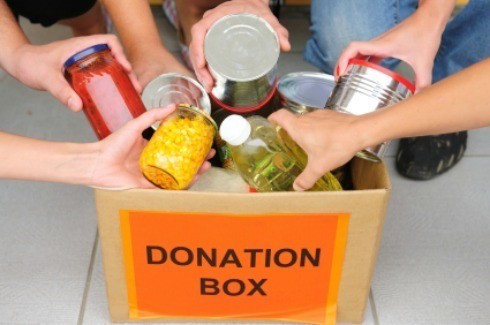Safety in Food Donations

All year round, many people turn to the aide of local food banks, pantries, and donations to feed their families. It is important to keep in mind that there are many people who are sick, homeless, without families, or alone with no one to turn to. In fact, in New Jersey there are about one in ten people who struggle with providing food for themselves as well as one in seven kids in the state missing about one meal a day. With this holiday fast approaching, many people dedicate their time and donations to these food shelters in hopes of helping families provide for themselves. Although all food donations are important and appreciated, many of them end up being food that is either spoiled/cannot be eaten, or junk foods that don’t have as large an effect on successfully feeding those who are in need of food.
Spoiled food can end up being donated because many people have food that has been sitting in their pantries for a very long time; they view donating food as a way to “get rid of” what they don’t need, making it dangerous for those who are on the receiving end. Also, as a result of donating food that has been expired, it is like throwing away another opportunity for and wasting the time of those who go to local food pantries and expect to find safe food they can eat. Many spoiled food examples include moldy bread and open cereal, along with potential spoiled cans of soup –all that have once served as a potential meal for someone who is either looking for food for themselves or just trying to provide for their families. This could also be a result of some food banks not thoroughly checking up on what they are receiving as well as the donor not looking at expiration dates.
Subsequently, many food pantries and banks end up asking for monetary donations instead so that they are able to get what they need instead of potentially accepting spoiled donations from those who do not pay much mind to it. Food banks use a specific process to organize their food. They put all of the expired or close to expiration date food in an emergency line for those who need it more urgently. Food banks also rely on the donors’ word when it comes to donating certain items.
Here are some guidelines to follow for those who are interested in donating:
- Food items that are recommended for donation, particularly for Thanksgiving, include: Canned pumpkin, canned yams, canned soup, canned corn, cranberry sauce, boxed stuffing, dried macaroni, oatmeal, rice, and pasta.
- Make sure that the item is either non-perishable or is not expired or very close to the expiration date (this ensures that the food bank can separate and organize the food in time without having to worry about the expiration date, or it may be mistakenly given out).
- Food items not recommended for donation include: home-produced canned foods, food items that have been prepared already at home, foods with an “off” odor, foods in open or broken containers, and perishable foods that are passed their expiration date, unless they are frozen.
If you or someone is in need of food, or if you’d like to volunteer to help in your local food pantry or food bank, please visit the link below to find a local pantry near you:
https://www.feedingamerica.org/find-your-local-foodbank

Q: What's your favorite food and least favorite food? Would you switch them for a day for $1000.
A: I love my mom's spaghetti and I hate mushrooms....






